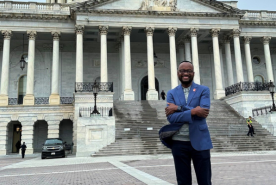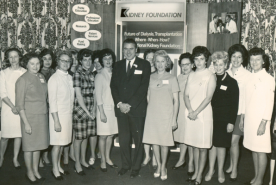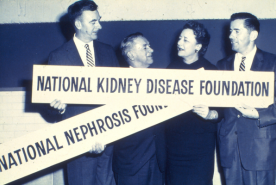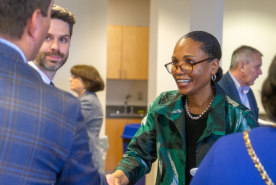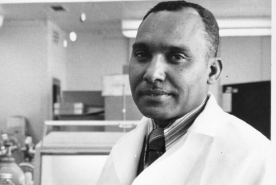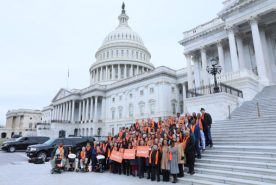July 02, 2024
Around 90,000 people in the United States are waiting for a kidney transplant, but there aren't enough organs to meet this need. The Living Donor Navigator Program at the University of Alabama at Birmingham is working to address this issue. Health Equity Patient Navigator, Alexis Carter (B.S., M.P.H.), explains how.
Understanding the Living Donor Navigator Program
The Living Donor Navigator Program aims to increase kidney transplants in Alabama by removing barriers to living kidney donations for potential recipients and donors.
"One of the main barriers to living donation that we aim to combat is a lack of education," Carter said. "In the US, especially in the Southeast, few people know what living donation is or that it is safe."
To overcome this barrier, The Living Donor Navigator Program works with potential recipients to identify living donor advocates who will help them in the search for a donor. Once identified, the advocate attends four in-person sessions.
"We prepare the advocate to educate the broader community. The goal is to take the burden of finding a donor off of the patient," said Carter. "Sessions one and two are education. We explain what living donation is and answer common questions potential donors have. In sessions three and four, we teach them how to approach potential donors.”
How do you get the word out? Social media campaigns, a website, or a bulletin at church—the Living Donor Navigator Program encourages advocates to get creative in spreading the word about living donations.
"We have a lot of positive feedback from advocates," said Carter. "Before taking the program, advocates don’t feel confident talking to a group of people about living kidney donation. Afterward, they feel educated and empowered."
Once a potential donor is identified a navigator is assigned to help them through the living donor evaluation.
"The navigator is a safety net. They make sure potential donors don't fall through the cracks," Carter said. "Navigators can help communicate with the transplant team and attend the donor's appointments. We want them to have a support system and not feel overwhelmed by the process."
Want to learn more about living kidney donation? NKF can help. Sign up for our free online course on living donation.
Busting Kidney Donation Myths
A large part of the program is busting kidney donation myths–two of which stand out.
"The first myth is that donors need to take a lot of medication after the surgery. That isn't true," said Carter. "Donors may take some pain medication or stool softeners to help with recovery but only for a short time."
The second myth is that a donor will need a kidney in the future.
"The donor evaluation looks at the potential donor in their entirety. You must be mentally, financially, and physically able to donate and have a support system. Only people who can live a long healthy life with one kidney are approved," Carter said. "While unexpected events can occur, a donor shouldn't need to join the transplant waitlist."
Learn more about kidney donation myths.
Increasing Living Donors
The program, first introduced in 2017, has shown promising results.
“The patients in the program were seven times more likely to find and have a living kidney donor approved,” said Carter. "Black/African Americans were also as likely to find and have a living kidney donor approved when compared to other groups."
This was an important finding for the team. Historically, Black/African Americans are less likely to become or receive a kidney from a living donor.
"There is fear in the Black/African American community about becoming a donor and talking about the need for a donor," said Carter. "Our program empowers people to go out into their community to provide education and help remove that fear."
Now, the team is looking to expand.
"We're running a clinical trial to see if the program can be effective through telehealth," said Carter. "We want to help even more people and continue to positively impact the lives of patients and their loved ones."
The Living Donor Navigator Program is making great strides in increasing transplant rates in the state but there is still work to do. Join NKF’s mission to create a future where everyone who needs a kidney gets one–a future where there are Transplants for All. Sign NKF's Equity Spotlight Petition to join our mission. Together, we can create a more equitable future in kidney healthcare.
Source
1Locke JE, Reed RD, Kumar V, Berry B, Hendricks D, Carter A, Shelton BA, Mustian MN, MacLennan PA, Qu H, Hannon L, Yates C, Hanaway MJ. Enhanced Advocacy and Health Systems Training Through Patient Navigation Increases Access to Living-donor Kidney Transplantation. Transplantation. 2020 Jan;104(1):122-129. doi: 10.1097/TP.0000000000002732. PMID: 30946213; PMCID: PMC6773517.

